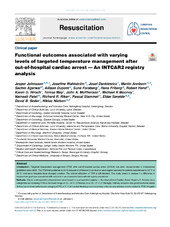| dc.contributor.author | Johnsson, Jesper | en_US |
| dc.contributor.author | Wahlström, Josefine | en_US |
| dc.contributor.author | Dankiewicz, Josef | en_US |
| dc.contributor.author | Annborn, Martin | en_US |
| dc.contributor.author | Agarwal, Sachin | en_US |
| dc.contributor.author | Dupont, Allison | en_US |
| dc.contributor.author | Forsberg, Sune | en_US |
| dc.contributor.author | Friberg, Hans | en_US |
| dc.contributor.author | Hand, Robert | en_US |
| dc.contributor.author | Hirsch, Karen G. | en_US |
| dc.contributor.author | May, Teresa | en_US |
| dc.contributor.author | McPherson, John A. | en_US |
| dc.contributor.author | Mooney, Michael R. | en_US |
| dc.contributor.author | Patel, Nainesh | en_US |
| dc.contributor.author | Riker, Richard R. | en_US |
| dc.contributor.author | Stammet, Pascal | en_US |
| dc.contributor.author | Søreide, Eldar | en_US |
| dc.contributor.author | Seder, David B. | en_US |
| dc.contributor.author | Nielsen, Niklas | en_US |
| dc.date.accessioned | 2020-07-02T07:10:41Z | |
| dc.date.available | 2020-07-02T07:10:41Z | |
| dc.date.issued | 2020 | |
| dc.Published | Johnsson J, Wahlström, Dankiewicz J, Annborn M, Agarwal S, Dupont A, Forsberg, Friberg H, Hand R, Hirsch KG, May T, McPherson JA, Mooney MR, Patel N, Riker RR, Stammet P, Søreide E, Seder DB, Nielsen N. Functional outcomes associated with varying levels of targeted temperature management after out-of-hospital cardiac arrest ? An INTCAR2 registry analysis. Resuscitation. 2020;146:229-236 | eng |
| dc.identifier.issn | 0300-9572 | |
| dc.identifier.issn | 1873-1570 | |
| dc.identifier.uri | https://hdl.handle.net/1956/23213 | |
| dc.description.abstract | Introduction: Targeted temperature management (TTM) after out-of-hospital cardiac arrest (OHCA) has been recommended in international guidelines since 2005. The TTM-trial published in 2013 showed no difference in survival or neurological outcome for patients randomised to 33 °C or 36 °C, and many hospitals have changed practice. The optimal utilization of TTM is still debated. This study aimed to analyse if a difference in temperature goal was associated with outcome in an unselected international registry population. Methods: This is a retrospective observational study based on a prospective registry — the International Cardiac Arrest Registry 2. Patients were categorized as receiving TTM in the lower range at 32–34 °C (TTM-low) or at 35–37 °C (TTM-high). Primary outcome was good functional status defined as cerebral performance category (CPC) of 1–2 at hospital discharge and secondary outcome was adverse events related to TTM. A logistic regression model was created to evaluate the independent effect of temperature by correcting for clinical and demographic factors associated with outcome. Results: Of 1710 patients included, 1242 (72,6%) received TTM-low and 468 (27,4%) TTM-high. In patients receiving TTM-low, 31.3% survived with good outcome compared to 28.8% in the TTM-high group. There was no significant association between temperature and outcome (p = 0.352). In analyses adjusted for baseline differences the OR for a good outcome with TTM-low was 1.27, 95% CI (0.94–1.73). Haemodynamic instability leading to discontinuation of TTM was more common in TTM-low. Conclusions: No significant difference in functional outcome at hospital discharge was found in patients receiving lower- versus higher targeted temperature management. | en_US |
| dc.language.iso | eng | eng |
| dc.publisher | Elsevier | eng |
| dc.rights | Attribution-NonCommercial-NoDerivs CC BY-NC-ND | eng |
| dc.rights.uri | http://creativecommons.org/licenses/by-nc-nd/4.0/ | eng |
| dc.title | Functional outcomes associated with varying levels of targeted temperature management after out-of-hospital cardiac arrest ? An INTCAR2 registry analysis | en_US |
| dc.type | Peer reviewed | |
| dc.type | Journal article | |
| dc.date.updated | 2020-01-30T06:21:25Z | |
| dc.description.version | publishedVersion | en_US |
| dc.rights.holder | Copyright 2019 The Author(s) | |
| dc.identifier.doi | https://doi.org/10.1016/j.resuscitation.2019.10.020 | |
| dc.identifier.cristin | 1783094 | |
| dc.source.journal | Resuscitation | |

